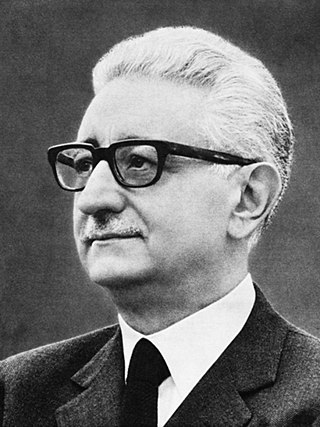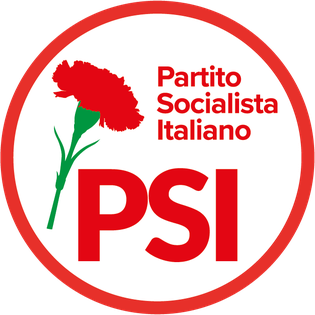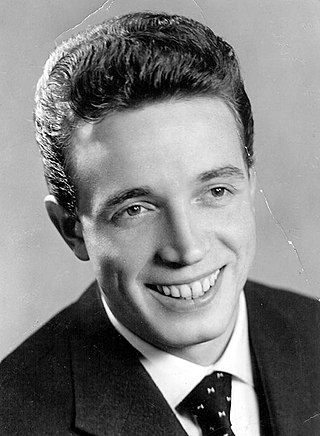
The South Tyrolean People's Party is a regionalist and mostly Christian-democratic political party in South Tyrol, an autonomous province with a German-speaking majority in northern Italy. Dieter Steger has been party leader since 2024, while party member Arno Kompatscher has been governor of South Tyrol since 2014.

Giovanni Leone was an Italian politician, jurist and university professor who was President of Italy from 1971 to 1978. A founding member of Christian Democracy (DC), Leone briefly served as Prime Minister of Italy from June to December 1963 and again from June to December 1968. He was also President of the Chamber of Deputies from 1955 to 1963.

The Italian Democratic Socialists was a social-democratic political party in Italy. The party was the direct continuation of the Italian Socialists, the legal successor of the historical Italian Socialist Party. The Italian Democratic Socialist Party, the other long-time Italian social-democratic party, was merged into it along with other minor parties. The party's long-time leader was Enrico Boselli, a former president of Emilia-Romagna (1990–1993). In 2007, the SDI were merged with other descendants of the PSI to form the modern-day Italian Socialist Party.

The Italian Socialist Party was a social democratic and democratic socialist political party in Italy, whose history stretched for longer than a century, making it one of the longest-living parties of the country. Founded in Genoa in 1892, the PSI was from the beginning a big tent of Italy's political left and socialism, ranging from the revolutionary socialism of Andrea Costa to the Marxist-inspired reformist socialism of Filippo Turati and the anarchism of Anna Kuliscioff. Under Turati's leadership, the party was a frequent ally of the Italian Republican Party and the Italian Radical Party at the parliamentary level, while lately entering in dialogue with the remnants of the Historical Left and the Liberal Union during Giovanni Giolitti's governments to ensure representation for the labour movement and the working class. In the 1900s and 1910s, the PSI achieved significant electoral success, becoming Italy's first party in 1919 and during the country's Biennio Rosso in 1921, when it was victim of violent paramilitary activities from the far right, and was not able to move the country in the revolutionary direction it wanted.

The Trentino Tyrolean Autonomist Party is a regionalist, autonomist, Christian-democratic and centrist political party in Trentino, Italy. The PATT, heir of the Trentino Tyrolean People's Party, is the unofficial counterpart of the South Tyrolean People's Party (SVP), active in South Tyrol. The two are members of the European People's Party (EPP) and usually contest general and European Parliament elections together. Simone Marchiori is the party's current secretary, while former senator Franco Panizza serves at its president. The PATT has led the provincial government with Carlo Andreotti in 1994–1999 and Ugo Rossi in 2013–2018, as well as the regional government with Andreotti in 2002–2004 and again with Rossi in 2014–2016.
The Socialist Party was a tiny social-democratic political party in Italy.
The Reformist Socialist Party was a tiny social-democratic political party in Italy.

The Italian Socialist Party is a social-democratic political party in Italy. The party was founded in 2007–2008 by the merger of the following social-democratic parties and groups: Enrico Boselli's Italian Democratic Socialists, the faction of the New Italian Socialist Party led by Gianni De Michelis, The Italian Socialists of Bobo Craxi, Democracy and Socialism of Gavino Angius, the Association for the Rose in the Fist of Lanfranco Turci, Socialism is Freedom of Rino Formica and some other minor organisations. Until October 2009, the party was known as Socialist Party.

Lega Trentino, whose complete name is Lega Trentino per Salvini Premier, is a regionalist political party active in Trentino. The party was a "national" section of Lega Nord (LN) from 1991 to 2000 and has been the regional section of Lega per Salvini Premier (LSP) in Trentino since 2020.

The Associative Movement of Italians Abroad is an Italian political party representing Italians abroad. Based in Argentina and active mainly in South America, the MAIE is a centrist party.

Alliance for Italy was a centrist political party in Italy.
Piero Ruzzante is an Italian politician from Veneto.

Italia. Bene Comune was a centre-left political list and electoral alliance in Italy created to stand at the 2013 Italian general election. It de facto ended on 28 April 2013, with PD's new leader Enrico Letta forming a grand coalition cabinet.
The Liberal Socialist Movement, called until 18 December 1994 the Federation of Socialists, was a social-democratic political party in Italy.

Democratic Centre is a centrist, Christian leftist and social-liberal political party in Italy. Most of its members, including its leader Bruno Tabacci, are former Christian Democrats. Since its beginnings, the CD has been also part of the centre-left coalition, centred around the Democratic Party (PD).

The South American Union of Italian Emigrants is an Italian political party representing Italian minorities in South America, especially Argentina and Brazil.

Claudio Signorile is an Italian politician.

Giuseppe "Gipo" Farassino was an Italian singer, songwriter, musician and politician.
The Federation of Young Socialists is the youth wing of the Italian Socialist Party.
Francesco De Lucia was an Italian politician. A member of the Italian Socialist Party, he was mayor of Bari from 1981 to 1990.















